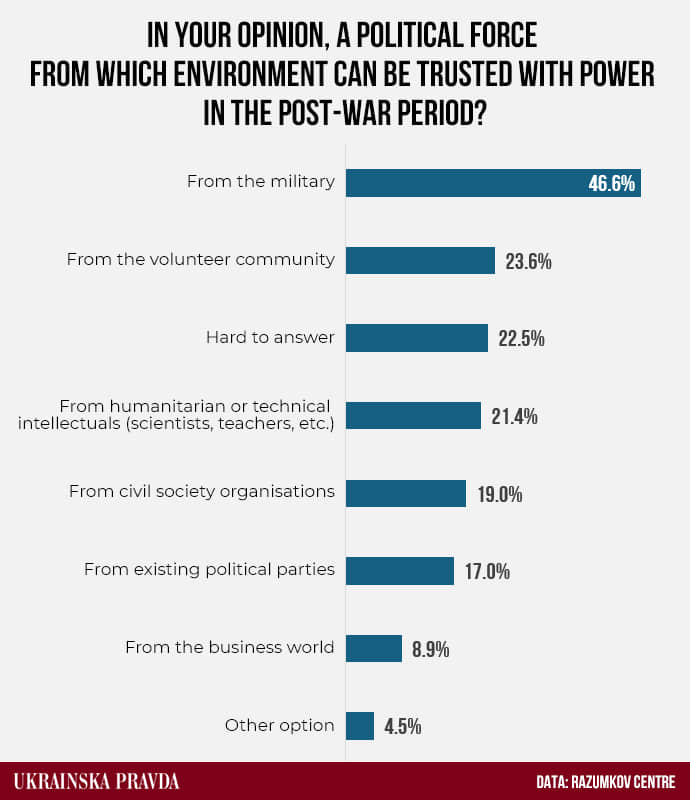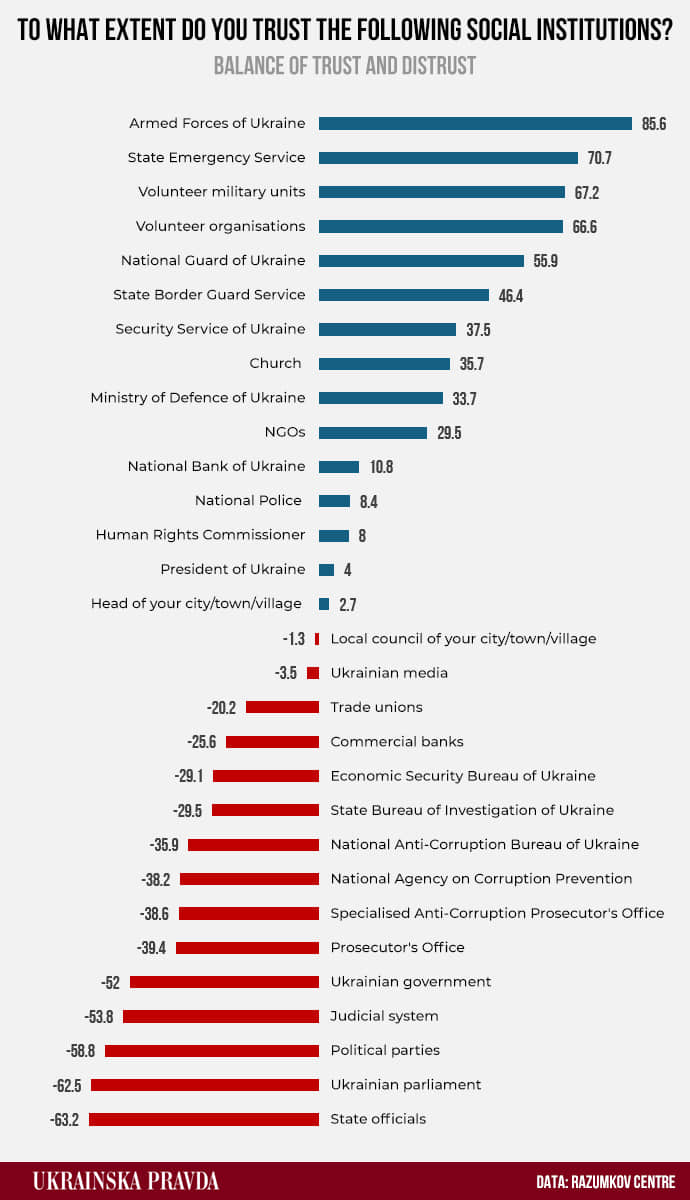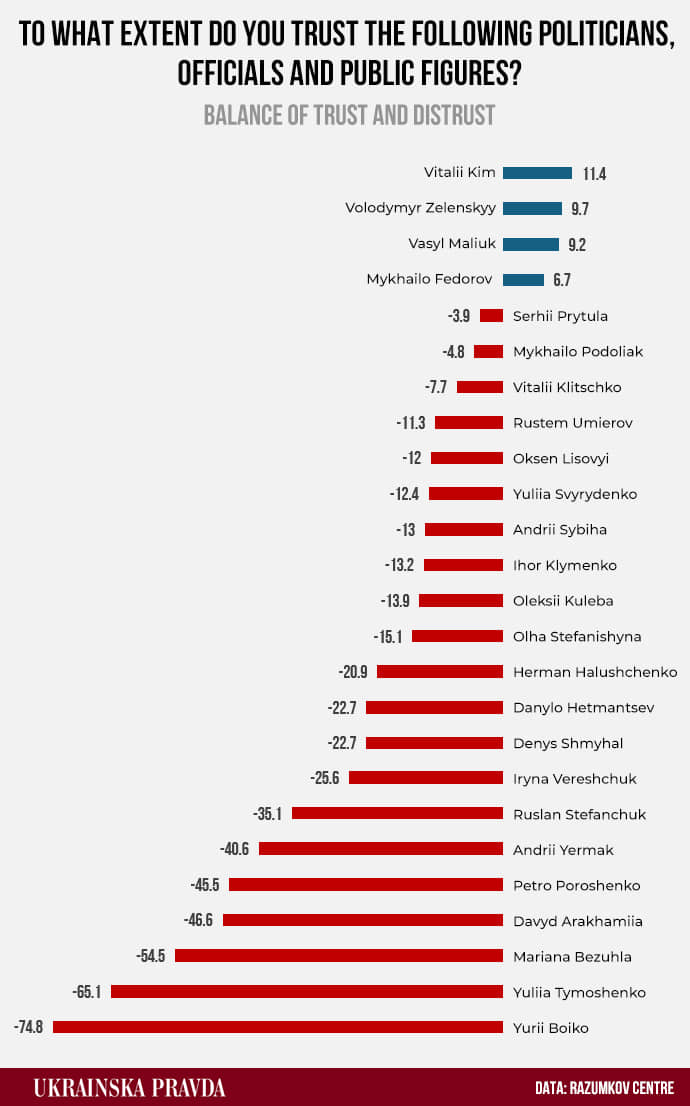Are elections in Ukraine possible before the war ends, and who is likely to win?
In Ukrainian politics, autumn has always been a time to discuss and prepare for elections. The third autumn during the full-scale war is no exception. As early as the end of September, analytical articles began to appear in the Ukrainian media stating that "the government is preparing for elections", or that "the deputy heads of the President's Office are holding election-related meetings".
This self-hypnosis is infectious - it has a magnetic effect on political actors from various political groups. Some have been recalling how they "heroically saved Kyiv when the government ran away" [a reference to a recent claim by former president Petro Poroshenko - ed.], although everyone remembers that the government did no such thing, and others have been buying up advertising spaces in the regions for election campaigning.
Advertisement:No one is overly concerned about the fact that the Central Election Commission (CEC), which has sole responsibility for holding elections, is not taking any action in this regard. Or the fact that any moves by the CEC would require the Verkhovna Rada (Parliament) to call an election, and elections are still prohibited (!) during martial law.
To avoid causing further confusion and turmoil among experts and analysts, Ukrainska Pravda decided that rather than doing a deep dive into legislative analysis, we would ask sociologists whether public demand is the primary factor in legitimising any election - in other words, whether Ukrainians want to elect a new government, whether that is possible before the end of the war, and which side is currently favoured by the electorate. Spoiler alert: it's all extremely complicated, and the figure of Valerii Zaluzhnyi renders the situation even more confusing.
Reasons (not) to hold elections
Ukraine is now in the third year of a full-scale war, and this, coupled with the impossibility of a real reset of power, has created a tense electoral situation in Ukrainian society. The vast majority of voters do not regard the current crop of politicians as capable of governing efficiently.
Yet an overwhelming majority of voters are also against elections being held. A major public opinion poll released by the Razumkov Centre on 15 October clearly demonstrates the trend described above.
Advertisement:Asked whether they saw any political groups among the existing ones that could be entrusted with power in the post-war period, only 27% of respondents answered "yes". In other words, in effect, 70% of respondents suggest that there is demand for a new set of political actors.
Usually, in countries where the current political elites are so firmly rejected, there is an increased risk of social cataclysms. But everything works the other way round in Ukraine. Cataclysm is already a mundane reality, and its presence actually works to legitimise the team in power.
"People are not in a hurry to vote," explained Anton Hrushetskyi, executive director of the Kyiv International Institute of Sociology (KIIS), in a conversation with Ukrainska Pravda. "They want an answer to the question of what the security configuration for the country will be. And the previous president criticising how the authorities acted when the [full-scale] invasion started won't generate more support for the idea of elections. The spread of Russian narratives about the 'illegitimate Ukrainian government, which needs this war' doesn't help either.
People understand that this is an existential war which aims to destroy us, so they want to have the security issue resolved first, and then hold elections. We'll shortly be publishing the data from one of our polls in which over 60% of people say they are prepared to endure the war for as long as it takes. But there is a demand for the burden of war to be fairly distributed.
And when Ukrainians see, say, prosecutors or other officials with 'disabilities' [disability certificates illegally obtained through corruption - ed.], that stokes up a sense of aggression," adds Hrushetskyi. There is a clear correlation between the existence of effective security guarantees for Ukraine and Ukrainians' readiness to engage in some form of negotiation, Hrushetskyi says.
Advertisement:"Our data shows that over 80% of Ukrainians believe that if the West supports Ukraine properly, Ukraine can win the war. However, we also see that a significant number of these people would not agree to official recognition of the occupation, but they would be prepared to 'postpone' the liberation of some territories to the future.
They would only be prepared to do that on condition of serious security guarantees - that Russia will not attack again. If there is no configuration of reliable guarantees - either NATO membership or bilateral agreements, etc. - then most Ukrainians are against reconciliation with Russia. But if there are convincing guarantees, then for most Ukrainians it would be a reluctantly agreed-to, but acceptable option," says Hrushetskyi.
In Hrushetskyi's opinion, unless the issue of strategic security and ending the hot phase of the war is resolved, Ukrainians tend to perceive elections as an attempt by the current elite to cling onto their positions. This is especially true if one considers that voters would like to place the country's leadership into other hands. The Razumkov Centre poll shows exactly whose hands those are.

When respondents were asked what environment a political party should come from for them to vote for it, nearly one in two - 46.6% - expressed trust in the military.
This figure has been stable at +/-50% since last summer. Voters also have a stable and significant interest in civil society organisations (19.0%) and the volunteer community (23.6%). In addition, 21.4% of respondents would like to see new faces from the humanitarian and technical intelligentsia, such as scientists and teachers.
Only 17.0% have faith in the existing parties. "People would prefer to see people who are involved in the Ukrainian defence forces, volunteers and civil society in power. But the issue is that all of these categories of people are currently working for the defence and would not be able to fully participate in the elections.
This also serves as a reason to say that while real Ukrainians - the real backbone of Ukraine - are defending the country, politicians and officials are trying to preserve their access to the 'feeding trough'. Therefore, holding elections without a proper explanation would be a false start with a negative outcome," says Hrushetskyi.
A place for new political groups
As Ukraine faces its third winter since the full-scale invasion, support for government institutions has plunged almost to pre-war levels. In the first half of 2022, sociologists noted a very interesting trend.
At that time, even the most electorally challenging authorities, such as the parliament and the courts, enjoyed an unprecedented level of trust. In the face of an existential threat, Ukrainians felt that they and their state were one. In fact, this was one of the things that helped Ukraine survive as a state in the early weeks.
But in the third year of the full-scale war, the sense of threat has ceased to legitimise the government's actions. All polls in recent months show the same trend - a steady decline in trust in most government institutions that are not directly involved in the defence forces. The Armed Forces have a trust balance of almost +86%, the State Emergency Service has about +71%, volunteer organisations have approximately +67%, and the Security Service of Ukraine has almost +38%.
On the other hand, the Verkhovna Rada has -62.5%, the government has -52%, state officials have -63.2%, and the judiciary as a whole has -53.8%.

In this regard, the level of trust in President Volodymyr Zelenskyy remains a significant point. His trust balance is currently at +4% (48.5% trust and 44.5% distrust), but with a slow downward trend. Support for Zelenskyy, which reached 90% at the beginning of the full-scale invasion, is essentially being held hostage by a general decline in confidence in the system.
Moreover, the high support for the army has ceased to translate into the same support for its Supreme Commander-in-Chief, Zelenskyy. Interestingly, the personal level of support for Zelenskyy as a politician rather than as president is higher: 51.3% trust / 41.5% distrust.
Advertisement:The Razumkov Centre noted that apart from the president, only a few well-known politicians have a positive trust rating: Vitalii Kim, Head of Mykolaiv Oblast Military Administration, has +11.4%; Vasyl Maliuk, Head of the Security Service of Ukraine, has +9.2%; and Mykhailo Fedorov, Deputy Prime Minister and Minister for Digital Transformation, has +6.7%. The league table of least trusted politicians is topped by Andrii Yermak, Head of the Office of the President of Ukraine, with -40.6%, and almost all of the other people in it are heads of parliamentary factions: Petro Poroshenko (European Solidarity) has -45.5%, Davyd Arakhamiia (Servant of the People) has about -47%, Yuliia Tymoshenko (Batkivshchyna) has slightly less than -65%, and Yurii Boiko (the pro-Russian Platform for Life and Peace) has -74.8%.

It is also interesting to note which data is not there in the survey.
There is a key figure in political life whose ratings and trust levels are not measured in the published part of the Razumkov Centre study - Valerii Zaluzhnyi, former commander-in-chief of the Armed Forces of Ukraine and Ukraine's current ambassador to the UK. In an environment where the "old old" and "new old" elites do not inspire public trust, a figure like Zaluzhnyi can play a pivotal role. If you look at the voters' demand for new faces, 50% of potential voters for a hypothetical "party of the military" would be the perfect territory for an "offensive" by Zaluzhnyi.
"As always, we have a leadership approach to voting," says Hrushetskyi. "So support for political projects will be largely determined by people's attitude towards the leader. For example, let's imagine that Serhii Prytula [a public figure who chairs a military volunteer foundation - ed.] starts a political party. If we ask people how they feel about it, or add the party to certain electoral lists that we have not yet published, this party gains quite a high level of support because Prytula himself enjoys a high level of support right now.
We haven't had a hypothetical party led by, say, Taras Chmut [head of the military volunteer charity Come Back Alive - ed.], but I assume that if there was an awareness-raising campaign, that could also receive considerable support. There are questions about people serving in the military, because they can be distributed across various political groups. But if we have a hypothetical party led by Valerii Zaluzhnyi - which he hasn't said a word about yet - it could really gain very high levels of support.
You get two completely different results when Zaluzhnyi is in the poll and when he isn't," Hrushetskyi explains. A colleague of Hrushetskyi's from another polling service admits off the record that with some modelling of the ballot paper, a situation could arise where the balance of power is similar to the 2019 elections. Only this time, the name of the winner will be different.
Advertisement:The situation is similar when it comes to the party elections to the Verkhovna Rada.
That's one of the reasons why Ukrainska Pravda sources in the Servant of the People party are sceptical about talk of early elections: people don't want them, and the government has every chance of suffering a dramatic defeat. It is more logical for the authorities to complete the processes in domestic and foreign policy that are important to them, and only then open the door to the dark room marked "Elections". "In the case of Volodymyr Zelenskyy, there is a slow downward trend of support.
Trust in him is high, but support for Zaluzhnyi is rising rapidly. He still maintains trust at 80-90%. Plus, as in the situation with Zelenskyy in 2019, voters attribute their own traits and qualities to Zaluzhnyi, projecting the virtues and expectations they want them to have," Hrushetskyi says, explaining the nature of the potentially high political support for Zaluzhnyi.
*** Life and the security situation have changed dramatically in Ukraine, but the impact on Ukrainians' attitudes towards the idea of holding elections during the war is imperceptible. Since the beginning of the full-scale invasion, the vast majority of citizens have been categorically opposed to elections.
Gradually, by the autumn of 2024, a significant group of voters has emerged who would like a reset of the political system. Nevertheless, for most people, the top priority remains success in the war and security, not elections. Recent polls have shown that 25-30% of Ukrainians support the idea of holding elections. However, few of them are properly aware of the security risks, potential for manipulation, and limitations on participation by both those voting and those being voted for.
"In fact, if the question about voting is asked in more depth, support for elections, even among those in favour of them, declines even further," Anton Hrushetskyi says. "The fact that 25-30% of people are now in favour of elections reflects not so much a desire for elections per se as a political signal of dissatisfaction with what's happening in the country and internationally. It's not really a demand for immediate elections, but rather an opportunity to hit back at the authorities.
In some polls, people are even more concerned about corruption than elections." Roman Romaniuk, Ukrainska Pravda Translation: Myroslava Zavadska
Editing: Teresa Pearce